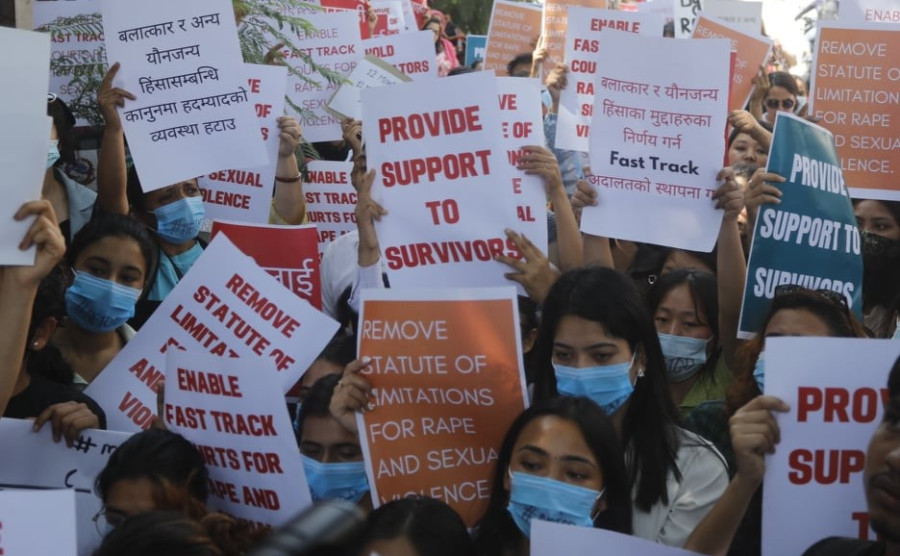Columns
Despair amid hope
The Nepali state must assure its citizens the country does not just belong to upper caste men.
Amish Raj Mulmi
It should have been a week to be enthused about a vocal youth’s active participation in the local elections. Rejecting a loose thutuno-ed man with a proclivity to abuse women in favour of a 32-year-old structural engineer and hip-hop artist, Kathmandu’s younger population warned political parties things can no longer remain the same. In Dharan, the new mayor is a long-time social activist who continues to ride a public vehicle and has declared the city’s drinking water crisis as his first priority. In Jumla, a ward has elected independent Dalits to four out of five positions, the candidates frustrated by the fact that upper caste leaders only saw them as vote banks. As many as 42 percent of the newly elected representatives are below the age of forty.
As much as these results inform us about our country’s aspirations and ambitions, they say more about a society exhausted by the unfulfilled promises of our leaders. People are looking for suitable alternatives, and perhaps the youth’s ideals can be a salve to the cynicism of the older generation. Nepal doesn’t just need one Balen Shah. What it needs is an entire generation that has woken up to the layered realities around them.
Shah’s victory should have brought us hope, but what we instead get is despair. It took a former child actor and model’s anguished cries on social media for all of Nepal to wake up to the fact that rape cases have a statute of limitations of a year. That she was a minor when drugged and raped by a beauty pageant organiser, and that too multiple times, tells us about the prevalent impunity in rape cases (and about the collusion within the pageant industry). As a report in this newspaper noted, ‘of the 6,259 rape and attempted rape cases registered in courts in the last fiscal year", there were convictions only in 1,260 cases. Nepal also has the shortest statute of limitations with respect to rape among all countries in South Asia. Witnesses in rape cases are often intimidated, or made to change their statements as they did in the recent Paul Shah case. And this is just the tip of the iceberg, with social stigma and shame forced upon survivors.
As if this wasn’t enough, a Chabahil school teacher was arrested on charges of sexual harassment. An Itahari girl has complained of her principal repeatedly raping her inside the school premises. One knows these are not the only stories. And one also knows this will not be the end, not unless Nepal can ensure the state provides a method of redressal that believes the survivor, and metes out justice in a manner befitting the crime. The petition filed by six women advocates in the Supreme Court demanding the removal of the statute of limitation must be heard as quickly as possible. But that alone won’t be enough.
Over and over
In an ideal world, and in an ideal state, the justice system would have responded swiftly and ensured survivors and witnesses were not intimidated, and the perpetrators would receive their dues. But what do we make of a state where even two years after a 21-year-old man and five of his friends were massacred by a mob of upper-caste men, only because he dared to love a girl from their caste, justice is nowhere in sight? "There will be other Navarajs, Ajits and Pramilas as long as caste remains the foundation of our society," I’d written almost two years ago after the Rukum massacre, because inequality has been normalised into our very being. The perpetrators of the massacre are out of prison, while the mothers of the killed can do nothing but sit on dharna in Kathmandu hoping the state notices their pleas.
This is also a country where a 24-year-old is beaten to death for going up against illegal sand mining. Three years later, of the seven who killed Dilip Mahato, four are roaming free. The case had been listed for hearing five times between April-December 2021, but Dhanusha District Judge Dhurba Raj Karki did not hear it even once. Instead, Dilip’s family has now been dragged into the legal labyrinth, the might of the state against a family fighting for justice.
Between these two cases, and the prevailing impunity that is visible in violence against women, the law then makes little sense for ordinary Nepalis. The justice system clearly operates differently for those on different spectrums of the socio-economic ladder. If our justice system could be measured by the number of panels and committees we set up to "investigate" such instances, we’d surely be right up there in redressals.
Delayed justice
A functioning state operates as a social contract between its institutions and its citizens. At the heart of the state’s responsibility towards its citizens is to provide them with justice. But in Nepal, our leaders shy away from social justice, and are willing to ram home an unequal constitution than one that considers women as equal to men. Even in these local elections, despite all the hope, fewer women candidates have been elected–and those who have are primarily in the vice-mayor position, because the men who take the decisions cannot bear to have a woman lead them.
Nepal banned women under 40 from travelling abroad by themselves in the name of "protection from potential abuses", but we now know abuse begins right in our schools itself. Instances of caste and gender violence are buried under a collective amnesia. This can no longer continue. The Nepali state must assure its citizens the country does not just belong to upper caste men.




 20.53°C Kathmandu
20.53°C Kathmandu















